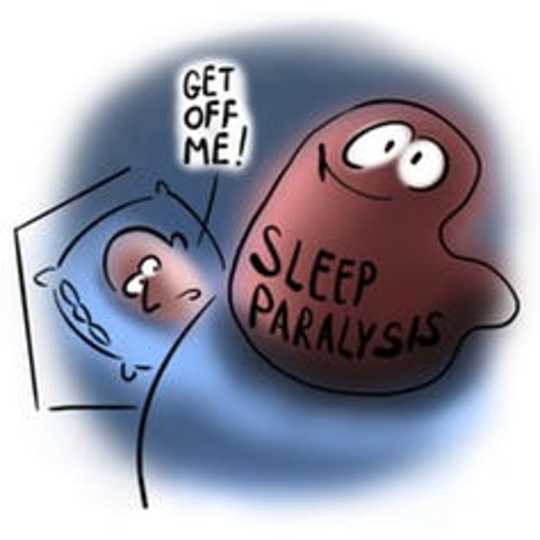
Sleep paralysis is when you wake up but feel like you can’t move. Shutterstock
Falling asleep is a bit like flicking off a light switch. One moment we are awake, but then the switch is flicked and we fall asleep.
That’s how it’s supposed to work, anyway. But sometimes, the switch gets a bit “sticky” and the light flickers between being awake and asleep. This is what happens with sleep paralysis – when you wake up but feel like you can’t move.
To answer your question, you’re more likely to experience sleep paralysis if:
- someone in your family has it;
- you don’t get enough sleep or you have changed your regular sleep pattern
- you are a shift worker;
- it seems to be more common when you sleep on your back (but we don’t know why);
- you are stressed or taking certain medicines;
- you have a sleep disorder such as narcolepsy (which is where you fall asleep suddenly and uncontrollably when it’s not really sleep time, like in class).
Many people experience sleep paralysis at some stage, and it’s usually first noticed in teenagers. It can affect men or women.
Overall, though, there’s still a lot scientists don’t know about sleep paralysis and why some people are more prone to it than others.
Here’s a bit about what we do know.
 Sleep paralysis can feel like something is sitting on you and stopping you from moving. Shutterstock
Sleep paralysis can feel like something is sitting on you and stopping you from moving. Shutterstock
Our brain is half asleep
In the olden days, some people called sleep paralysis the “Night Hag” and said it felt like a spooky witch or demon was sitting on your chest. Now we know it is quite a common sleep problem or what doctors call a parasomnia, caused by a little brain hiccup. And thankfully, it usually doesn’t last very long.
With sleep paralysis, some parts of your brain are awake and still active but other parts are fast asleep.
The sleeping part is the section of the brain that tells the muscles to relax while we sleep so we don’t act out our dreams. Evolution probably gave us that trick because acting out dreams can be harmful to yourself or others (although this trick doesn’t always work and some people do act out their dreams).
Sleep paralysis can feel pretty strange and scary, at least until you realise what is happening.
Sleep paralysis often doesn’t need treatment
If you are unable to move or speak for a few seconds or minutes when falling asleep or waking up, then it is likely that you have what doctors call “isolated recurrent sleep paralysis”.
If you sometimes experience sleep paralysis, here are some things you can try at home:
- make sure you get enough sleep
- try to reduce stress in your life, especially just before bedtime
- try a different sleeping position (especially if you sleep on your back)
See your doctor if sleep paralysis continually prevents you from getting a good night’s sleep.
Your doctor may ask about how you’re feeling, your health history and if your family has had sleep problems. They may tell you to go to a specialist sleep doctor who can investigate further.
About the Author
Danny Eckert, Director, Adelaide Institute for Sleep Health, Professor, College of Medicine and Public Health, Flinders University, Flinders University
This article is republished from The Conversation under a Creative Commons license. Read the original article.
Related Books:
The Body Keeps the Score: Brain Mind and Body in the Healing of Trauma
by Bessel van der Kolk
This book explores the connections between trauma and physical and mental health, offering insights and strategies for healing and recovery.
Click for more info or to order
Breath: The New Science of a Lost Art
by James Nestor
This book explores the science and practice of breathing, offering insights and techniques for improving physical and mental health.
Click for more info or to order
The Plant Paradox: The Hidden Dangers in "Healthy" Foods That Cause Disease and Weight Gain
by Steven R. Gundry
This book explores the links between diet, health, and disease, offering insights and strategies for improving overall health and wellness.
Click for more info or to order
The Immunity Code: The New Paradigm for Real Health and Radical Anti-Aging
by Joel Greene
This book offers a new perspective on health and immunity, drawing on principles of epigenetics and offering insights and strategies for optimizing health and aging.
Click for more info or to order
The Complete Guide to Fasting: Heal Your Body Through Intermittent, Alternate-Day, and Extended Fasting
by Dr. Jason Fung and Jimmy Moore
This book explores the science and practice of fasting offering insights and strategies for improving overall health and wellness.

























